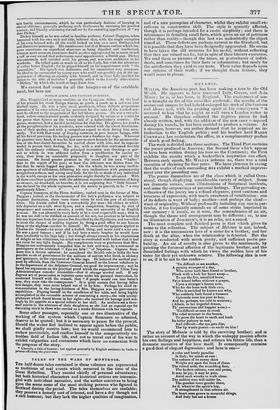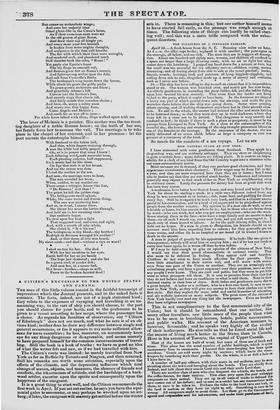MELANIE. '
Wissis, the American poet, has been making a tour to the Old World. Ile appears to have traversed Italy, Greece, and Asia Minor ; lie is, or has been, in England. The excitement of mo- ti:m brought on fits of the eacothes seribendi ; the novelty of the scenes and images he had beheld enlarged his stock of illustrations and ideas; and, with the pushing spirit of his countrymen " it occurred to him that he might as well turn a London writer to account." He therefore collected the fugitive pieces he had already written, and, with the addition of the new ones emmposed during his travels, he has been enabled to produce a volume. As a stranger, however, our author deemed that he required an in- troduetion to the English public ; and his brother bard BARRY CORNWALL has undertaken the office, in a complimentary preface of much good feeling. The work is divided into three sections. The Third Part contains the poems produced in America ; the Second those which appear to have been written during his tour on the Continent ; the First exhibits the results which a bookseller's inspiration can effect. Between each epoch, Mr. 'WILLIS informs us, there was a total cessation of rhyming for four years. We have pleasure in saying that the works of each succeeding asra exhibit a marked improve- ment over the preceding one. The poems themselves are of the class which is called Occa- sional, though displaying considerable variety of subject. Some are dramatic scenes, some iillustrations of Scriptural incidents, and some the outpourings of personal feelings. The pervading ex- cellencies of the poetry are a refined elegance, great neatness and terseness of expression, with much sweetness of versification : one of its defects is want of body; another—and perhaps the chief— want of originality. Without professedly imitating any one in par- ticular, it too frequently reminds us of some strain imprinted in our memory : it recals, as it were, the remembrance of an air,, though the theme and arrangement may be different ; or, to use an illustration of Jen NSON'S, it is an echo, not a sound.
The most complete and finished poem is that which gives its name to the collection. The subject of Melanie is not, indeed, new : it is the unconscious love of a sister for a brother, and her death at the altar, when the relationship is detected. But the story is conducted with much purity, and sufficient poetic pro- bability. An air of novelty is also given to the sentiments, by painting the fraternal affection of the legitimate brother, and the dissatisfied feelings with which he views the sudden love of his sister for their yet unknown relative. The following idea is new to us, if it be not to the reader-
'Tis difficult to see another, A passing stranger of a day, Who never bath been friend or brother, Pluck with a look her heart away--
To see the fair, unsullied brow,
Ne'er kissed before without a prayer, Upon a stranger's bosom now, Who for the boon took little care, Who is enriched he knows not why, Who suddenly hath found a treasure - Golconda were too poor to buy, And he, perhaps, too cold to measure; (Albeit, in her forgetful dream, Th' unconscious idol happier seem)—. 'Tis difficult at once to crush The rebel mourner in the breast, To press the heart to earth and hush
Its bitter jealousy to rest;
And difficult—the eye gets dim, The lip wants power—to smile on him !
The story of Melanie is told by the surviving brother; and is rather an account of the way in which the unhappy passion affects, his own feelings and happiness, and colours his future life, than a dramatic narrative of the love itself. It consequently contains
- a gocd deal of elegant digression: and here is one—
A calm and lovely paradise Is Italy, for minds at ease : The sadness of its sunny skies Weighs not upon the lives of these.
The ruined aisle, the crumbling hoe, The broken column, vast and prone, It may be joy, it may be pain,
Amid such wrecks to walk alone.
The saddest man will sadder be, The gentlest lover gentler there, As if, whate'er the spirit's key,
It strengthened in that solemn air.
The heart 800D grows to mournful things, And Italy has not a breeze
Bat comes ea melancholy wisp; And even her majestic trees Stand ghost-like in the Caesar's home, As if their conscious roots were set In the old grave* of giant Rome, And drew their sap all kingly yet. And every stone your feet beneath Is broken from sense mighty thought, And sculptures in the dust still breathe The fire with which their lines were wrought, And sundered arch, and plundered tomb Still thunder back the echo, " Route! "
Yet gayly o'er Egeria's fount The ivy flings its emerald veil, And flowers grow fair on Numa's mount, And light-sprung arches span the dale, And soft from Caracalla's Baths The herdsman's song comes down the breeze, While climb his goats the giddy paths To grass-grown architrave aud frieze; And gracefully Albano's hill Curves into the horizon's line, And sweetly sings that classic rill,
And fairly stands that nameless shrine ;
And here, oh, many a sultry noon And starry eve, that happy June, Came Angelo and Melanie ;
And earth for us was all in tune—
For while Love talked with them, Hope walked apart with me.
The lover of Melanie is a painter. His mother was the too trust- ing daughter of a noble Roman house; on the birth of her son, her family force her to assume the veil. The marriage is ta take place in the chapel of her convent, and in her presence : let the poet narrate the catastrophe himself—
With forehead to the lattice laid, And thin, white fingers straining through,
A nun the while had softly prayed—
Oh, ev'n in prayer that voice 1 knew !
Each faltering word,eaeh mournful tone, Each pleading cadence, half-suppressed, Such music had its like alone On lips that stole it at her breast. And ere the orison was done I loved the mother as the son.
And now, the marriage vows to hear,
The nun unveiled her brow, When, sudden, to my startled ear There crept a whisper, hoarse like fear, "Dc Breyer n ! is it thou?"
The priest let fall the golden ring, The bridegroom stood aghast, While, like some weird and frantic thing, The nun was muttering fast : And as, in dread, I nearer drew, She thrust her arms the lattice through, And held me to her straining view : But suddenly began To steal upon her brain a light
That staggered soul, and sense, and sight,
And, with a mouth all &ally white, She shriek'd, "It is his son!
The bridegroom is thy blood—thy brother ! Rodolph tie Brevern wronged his mother !" And, as that doom of love was heard, My sister sunk—and died—without a sign or word ! • • S • I shed no tear for her. She died With her last sunshine in her eyes. Earth held for her no joy beside The hope just shattered ; and she lies In a green nook of yonder dell ; And near her, in a newer bed, Her lover—brother—sleeps as well. - Peace to the broken-hearted dead



























 Previous page
Previous page